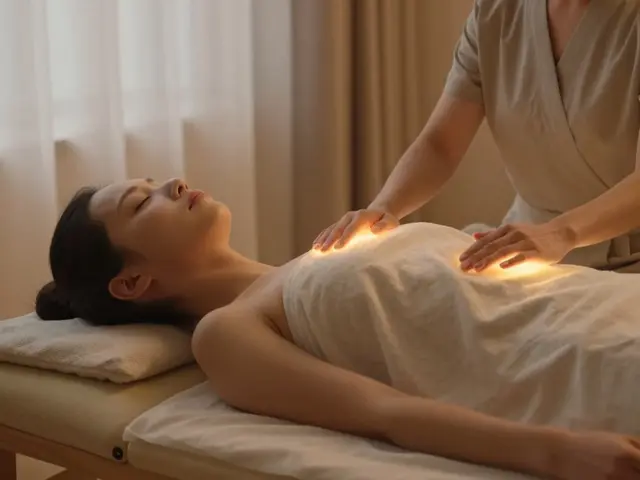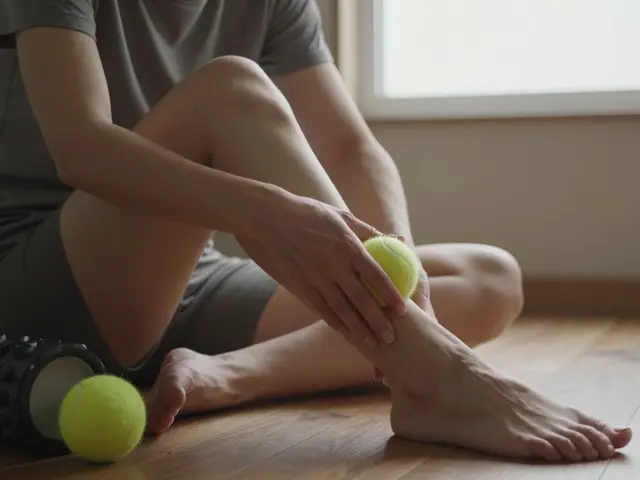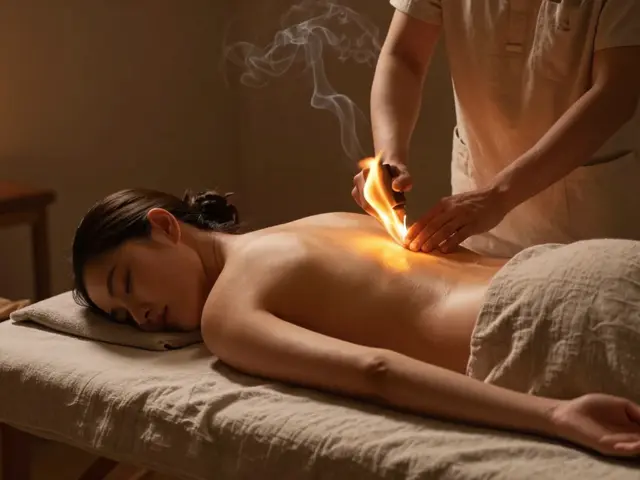Reiki massage is making waves in the wellness community as more people search for holistic approaches to health. This ancient Japanese technique involves using hands to transfer healing energy, promoting relaxation and balance.
Whether you're looking to reduce stress, enhance mental clarity, or alleviate physical pain, Reiki might be worth exploring. This gentle practice complements other treatments, offering a serene path to well-being.
So, what exactly is Reiki massage, and why is it becoming so popular? Let’s delve deeper and uncover the secrets behind this soothing practice.
- The Basics of Reiki Massage
- Health Benefits of Reiki
- Finding a Qualified Reiki Practitioner
- Tips for Your First Reiki Session
The Basics of Reiki Massage
Reiki massage, a blend of traditional massage techniques and the art of Reiki, is designed to harness and direct energy, providing profound relaxation and healing. Originating from Japan, Reiki translates to 'universal life energy,' and it operates on the idea that an unseen 'life force energy' flows through us, and we are alive because of it.
Dr. Mikao Usui, who developed Reiki in the early 20th century, believed that this energy could be channeled through the hands to promote physical and emotional healing. By placing hands lightly on or just above the body, a Reiki practitioner transfers this energy, helping to reduce stress, improve sleep, and amplify overall well-being. A typical session can last between 60 to 90 minutes, often beginning with a brief consultation to understand the recipient's needs.
Notably, this practice does not involve manipulation of the muscles, as in traditional massages, but instead focuses on energy fields around the body. The practitioner shifts their hands through various positions, usually starting at the head and making their way down to the feet. These positions are held for three to ten minutes each, depending on the individual's energy needs.
What to Expect During a Session
During a session, you remain fully clothed and lie on a treatment table. Soft music and a tranquil environment help ease you into a deeply relaxed state. Many clients report feeling warmth, tingling, or a gentle pulsating from the practitioner's hands, and some even drift into a soothing sleep. The experience is highly individualized, catering to each person's specific energy needs.
Reiki is praised for being non-invasive and safe, with no reported risks or side effects. A 2010 study published in the Journal of Alternative and Complementary Medicine found that Reiki could significantly reduce pain and anxiety, making it a popular choice for those seeking complementary therapies.
"Reiki treatments are a gentle and complimentary way to help individuals manage their personal health and wellness," says Dr. Ann Baldwin, a renowned researcher in energy healing.
Understanding the history and principles of Reiki massage provides a foundation for appreciating why it has become a trend in holistic healing. Its ability to cater to physical, mental, and emotional needs in a gentle, yet effective manner appeals to a wide range of people, making it an accessible remedy for anyone looking to enhance their well-being.

Health Benefits of Reiki
Reiki massage, often described as a spiritual healing art, is gaining recognition for its multitude of health benefits. This practice is praised for relieving stress, promoting relaxation, and aiding in the overall healing process. One of the most striking benefits is its potential to enhance mental clarity and emotional balance. Many people who receive Reiki treatments report a profound sense of calm, which helps to manage anxiety and improve mood.
A significant aspect of Reiki is its effect on physical health. It can help alleviate chronic pain, promote recovery after surgery, and even boost the immune system. A study published in the Journal of Evidence-Based Complementary & Alternative Medicine noted that Reiki could effectively decrease pain levels and improve patients’ quality of life. Some practitioners believe that Reiki can complement traditional medical treatments, offering holistic support during recovery.
One particularly compelling benefit is its ability to aid in better sleep. Those who struggle with insomnia or disrupted sleep patterns might find relief through regular Reiki sessions. This improvement in sleep quality can result in higher energy levels and better overall health. A well-known Reiki practitioner, William Lee Rand, once said
"Reiki works on the entire person—body, emotions, mind, and spirit—creating many beneficial effects including relaxation and feelings of peace, security, and wellbeing."
Interestingly, Reiki isn't limited to those with specific conditions. It can be a preventive measure thus supporting a healthy lifestyle by maintaining an optimal flow of energy throughout the body. Reiki's gentle and non-invasive nature makes it suitable for people of all ages, from children to the elderly.
During a session, the practitioner channels energy, which is thought to remove blockages and restore balance. This energy transfer can stimulate the body’s natural healing abilities, making it versatile in addressing various ailments. For instance, those dealing with migraine headaches or digestive issues might find significant relief after a series of sessions.
Another noteworthy benefit is Reiki’s role in reducing the side effects of medical treatments. Patients undergoing chemotherapy or radiation therapy can use Reiki to alleviate symptoms such as nausea, fatigue, and pain. This holistic approach can provide much-needed comfort and emotional support during challenging medical journeys.
Although scientific research is still uncovering all the potential benefits of Reiki, anecdotal evidence from practitioners and recipients suggests its considerable impact on mental and physical health. It’s this growing body of positive experiences and studies that contributes to the increasing popularity and acceptance of Reiki in the wellness community.
In summary, Reiki massage offers a holistic way of supporting health. Whether you're seeking to manage pain, reduce stress, or simply improve your overall sense of well-being, Reiki might be a practice worth exploring. The gentle, non-invasive, and restorative qualities of Reiki make it an appealing option for anyone looking to enhance their health and find inner peace.
The potential benefits of Reiki are vast, and as more people discover its healing power, it’s likely to continue growing in popularity. This energy-based treatment may just be the key to unlocking a new level of health and happiness in your life.

Finding a Qualified Reiki Practitioner
Finding a qualified Reiki practitioner can feel like a daunting task, but with a bit of research and intuition, you can discover someone who aligns with your healing journey. Reiki is a deeply personal experience, and its effectiveness can significantly depend on your comfort and connection with the practitioner. Here’s how to navigate the process.
First, look for practitioners who have completed comprehensive training. A well-trained practitioner will have certifications from reputable Reiki schools. These certifications often come in levels, such as Reiki I, II, and Master or Teacher. Completing all levels ensures the practitioner is well-versed in conducting sessions and understanding the nuances of energy work. Many practitioners also display their certifications online or in their practice space, so don't hesitate to ask about their qualifications.
Word of mouth is another powerful tool. Personal recommendations from friends or family who have had positive experiences with a particular practitioner can be invaluable. These firsthand accounts provide insight into the practitioner’s demeanor, approach, and effectiveness. If you’re new to Reiki, local wellness centers or holistic health clinics can also be good resources for finding recommendations.
In today’s digital age, online reviews play a crucial role. Platforms such as Google, Yelp, and even social media pages can be gold mines of information. Read through reviews to get a sense of the practitioner’s reputation and client satisfaction. Look for patterns in the feedback—consistent praise or recurring complaints can help you make an informed decision.
Personal comfort is key when choosing a Reiki practitioner. A great way to gauge this is through an initial consultation or interview. Many practitioners offer a free or low-cost consultation where you can discuss your needs, ask questions, and see if you feel at ease with them. Pay attention to how the practitioner addresses your concerns and whether their approach resonates with you. A good practitioner will be empathetic, patient, and respectful.
It's also beneficial to understand the practitioner’s style and philosophy. Some may integrate other modalities such as crystal healing, aromatherapy, or sound healing into their sessions. Others may focus strictly on traditional Usui Reiki. Knowing what to expect can help you find someone whose practice aligns with your preferences.
Another important factor is the setting in which the Reiki sessions will take place. The environment should be calm, clean, and conducive to relaxation. Take note during your initial visit or consultation. The energy of the space, its cleanliness, and even small details like the ambiance can significantly impact your overall experience.
"Reiki is more than just technique; it's about the connection between the practitioner and the recipient," says Maria Lopez, a renowned Reiki Master with over 20 years of experience. "Trust your instincts. The right practitioner will resonate with you on an energetic level."
Lastly, consider the practical aspects such as location and cost. Regular sessions are often recommended for the best results, so choosing someone accessible can make maintaining consistency easier. Costs can vary widely, so ensure their rates fit within your budget while still valuing the quality of the service.
Finding the right Reiki practitioner might take time, but the effort is worth it. Trust the process, follow your intuition, and soon you'll be on your way to experiencing the healing benefits of Reiki with a practitioner who truly understands your needs.

Tips for Your First Reiki Session
Embarking on your first Reiki session can be an exciting yet mysterious journey. This ancient healing practice, which involves the transfer of energy through the hands, promises a tranquil experience. To make the most out of your session, here are some practical tips to keep in mind.
Firstly, it's essential to choose a qualified Reiki practitioner. Look for certifications and, if possible, get recommendations from friends or online reviews. A good practitioner will make you feel comfortable and explain the process thoroughly before starting the session. Their calm demeanor and empathetic approach can significantly enhance your experience.
Before your session, try to arrive with an open mind. Reiki works best when you're not skeptical. Try to let go of any preconceived notions and be open to the healing process. Dress comfortably; loose clothing helps you relax more easily. Remember, this is a time for you to unwind and let go of everyday stresses.
Hydration is another key factor. Make sure to drink plenty of water before and after your session. Staying hydrated helps in the smooth flow of energy and assists in the detoxification process that Reiki often initiates. This can enhance the healing effects and prolong the feeling of relaxation.
During the session, you’ll likely be asked to lie down on a massage table fully clothed. The practitioner may place their hands lightly on or just above your body. Some people feel warmth, tingling, or even see colors while others might simply feel deeply relaxed. Each experience is unique, so there’s no right or wrong way to feel during your Reiki session.
It's also important to communicate with your practitioner. If you feel uncomfortable at any point or have any questions, don’t hesitate to speak up. Open communication helps the practitioner tailor the session to fit your specific needs and can make the experience more rewarding.
"Reiki is a method of activating and balancing the natural life-force energy within." - Caitlin Young, Certified Reiki Master
Post-session, give yourself time to absorb the experience. Many find that Reiki continues to work on their energy flow long after the session has ended. It’s a good idea to rest quietly for a few minutes afterward and reflect on how you feel. Some people like to keep a journal of their experiences, noting any physical or emotional changes.
Lastly, some people experience a 'healing crisis' after a session. This can include mild physical symptoms like headaches or emotional releases such as sudden bursts of tears. These reactions are generally a sign that the healing process is working and are temporary. They indicate that your body is flushing out toxins and making space for new, positive energy.
To conclude, your first Reiki session can be a profound step toward a holistic approach to wellness. With an open mind, proper preparation, and a qualified practitioner, you stand to gain relaxation, mental clarity, and a newfound sense of balance. Dive in with curiosity and allow yourself to fully experience the gentle and powerful flow of Reiki energy.










